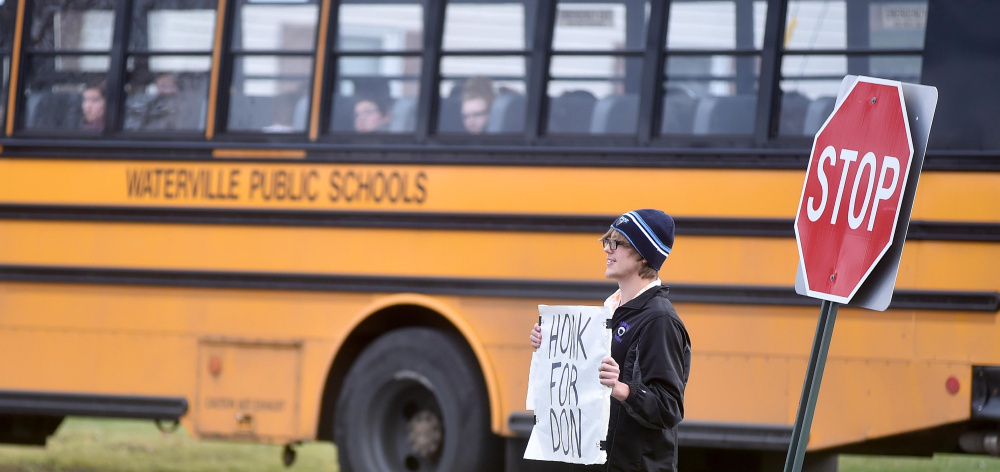The Don Reiter case is a strong example of why victims of sexual assault are often hesitant to come forward with allegations, according to area advocates of sexual assault victims.
It also provides insight into how sexual assaults can happen repeatedly at the hands of the same person with no one ever noticing, and how communities can sometimes be blinded by their trust for a person being accused of such a crime before all the facts in the case are known, said Donna Strickler, executive director of the Sexual Assault Crisis and Support Center, and Cara Courchesne, communications director for the Maine Coalition Against Sexual Assault.
Reiter, until Monday, was principal at Waterville High School. He was put on administrative leave Sept. 1 after allegations that he propositioned a student. He was summoned Thursday on a charge of official oppression, which is a misdemeanor related to a public figure misusing his authority.
Support for Reiter ran high in the initial stages of the three-day dismissal hearing before the Waterville Board of Education, with a gymnasium full of parents, students and community members giving him a standing ovation at one point and a small rally outside the high school in support of him before the board had made a decision.
That type of support illustrates part of the reason it can be hard for victims to come forward with allegations, especially when they are already likely to be in a position of lesser authority than the person they are accusing, the advocates said.
Both said there is no profile for a typical sexual offender, and that even people who are perceived as leaders or good people in the community can commit acts of sexual violence.
There’s also no “perfect victim,” a person who is innocent and has perfect behavior, Courchesne said.
“The perfect victim is someone people perceive to be really innocent and really honest,” she said. “That person wasn’t drinking, they were dressed appropriately and they fit all those societal ideas we have of what it means to be a victim. The reality is that there’s no perfect victim.”
Victims may also be less likely to be believed if they are in a position of lesser authority, whether it’s because they are younger, female or a teenager, Courchesne said.
Strickler added that misconceptions are understandable. Both advocates said that the number of false reports of sexual violence is low — around 2 percent, according to Strickler.
The stigma associated with being a victim of sexual violence is a large part of the fact that false accusations are rare, they said.
“What somebody is put through in reporting their experience is often times not pleasant,” Strickler said. “So for somebody to disclose or report this type of crime, it’s not just a report of stealing something from somebody’s home it’s a very different experience to report sexual assault.”
In Reiter’s case, during the hearing, the student’s name was made public online, as well as some of her personal history, and she was a target of insults, name-calling and negative speculation.
Courchesne said it can be hard for a community to believe a victim because an allegation of sexual violence could also mean that their community is less safe.
There is no simple explanation for what may lead someone to abuse their power, but it can sometimes stem from having been abused themselves when they were younger, she said.
“There is no profile for a sex offender, but research has shown that a lot of sex offenders have access to consensual sex, are not really overly violent or leave marks, but we do know that people in power can abuse it and that may have happened in this case,” Courchesne said. “Very few people are ever prosecuted or end up on a sex offender’s registry, and I think that’s because we have a societal belief that victims don’t tell the truth and there has to be some reason this person is reporting this abuse, not just because they have experienced this horrible thing.”
It is possible for sexual abuse to continue for a long time without a community ever knowing about it, in part because it often happens “behind closed doors,” Strickler said.
“We would like students and the community to know that nobody has to go through these experiences alone,” she said. “Often times people don’t come forward out of fear that nobody will believe them or that what we just saw in Waterville will happen to them, but we ask that they do consider talking to someone.”
Sharing the experience doesn’t have to mean sharing publicly or pressing charges either, said Courchese, but talking with an advocate or a trusted friend or family member helps to ensure that victims get the support they need. It can also help prevent a pattern of abuse from repeating itself.
In the Waterville case, some public opinion shifted after additional allegations were brought up against Reiter out of New Hampshire. Courchesne said it is unfortunate that it took additional allegations to give credibility to the Waterville victim’s story.
“I think before victims speak up we need to be more respectful and have a better system for them to do that,” she said.
Rachel Ohm — 612-2368
Twitter: @rachel_ohm
Send questions/comments to the editors.




Comments are no longer available on this story